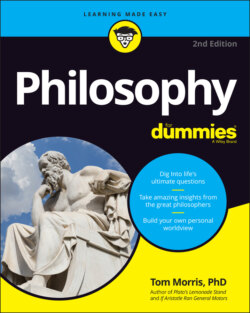Читать книгу Philosophy For Dummies - Tom Morris - Страница 51
Asking Questions We Can’t Answer
ОглавлениеThe skeptic asks some deep and challenging questions to which there are no quick and easy answers. As a result of studying these questions, you can come to a much deeper understanding of some really fundamental things that most people have long taken for granted.
To put it as simply as possible, philosophical skeptics want to ask why you believe what you believe. They want to know why you think you know the things you claim to know. They will ask you to investigate how you can have the knowledge you assert. And the particular way they choose to ask these questions can shed considerable new light on the foundations for all human beliefs and all the knowledge claims ever made.
In order to introduce the questions the skeptic urges people to ask, it will be useful to start off by making some simple distinctions. All beliefs ever held can be divided into three nonexclusive categories. This is a list of those simple categories and will be explained with examples in Table 5-1:
Past Oriented: Beliefs about the past
Present Oriented: Beliefs about the present
Future Oriented: Beliefs about the future
TABLE 5-1 Examples of Three Belief Categories
| Past Oriented | Present Oriented | Future Oriented |
|---|---|---|
| I believe Socrates taught Plato and Plato taught Aristotle. | I believe many nations are having economic trouble. | I believe global warming will raise ocean levels. |
| I believe that America asserted its independence in 1776. | I believe my investments are doing well, despite ups and downs. | I believe Germany will remain a democracy. |
| I believe my father fought in World War II. | I believe my wife is gardening now and is enjoying her time outside. | I believe that technology will continue to alter culture. |
| I believe I had toast for breakfast today. | I believe it’s sunny outside. | I believe you’ll eventually enjoy reading this book. |
Philosophical skeptics have some simple questions to ask, in two ways. First, they question the reliability of the sources for any beliefs concerning things past, present, and future. Then they raise even more radical questions with crazy-sounding hypotheses about each of these categories of belief. These two types of questions, or inquiries, can be called source skepticism and radical skepticism, which will be explained in the following sections.
